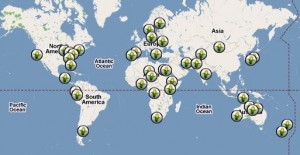The bumblebee Bombus subterraneus is extinct in the UK — it was last seen in 1988 at Dungeness nature reserve on the south Kent coast — but has been thriving in New Zealand.
The short-haired bumblebee was exported from the UK to New Zealand on the first refrigerated lamb boats in the late 19th Century to pollinate clover crops.
It has disappeared in Britain (though it apparently is still to be found on the continent) because of “[l]oss of extensive, herb-rich grasslands, especially those containing good stands of plants of the families Lamiaceae and Fabaceae, through agricultural intensification.” But now there’s a plan to set up a captive breeding programme using the expats, with a view to reintroduction, including in restored habitats.
I could not find any information on whether the decline of the short-haired bumblebee affected the pollination of any plant species, or whether the slack has been taken up by other bumblebees. But be that as it may, this is an interesting example of assisted migration, of a sort, though I don’t think climate change has been implicated in the fate of the insect in Britain. It’s also an example of going back to former colonies to look for genetic resources that are no longer to be found in the “mother” country. Like those Hopi peaches of a few days back. Uhm, I feel another post coming on…
